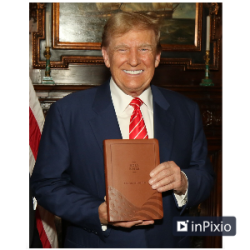For the majority of American evangelicals, voting for any candidate but Donald Trump or being a Democrat as opposed to a Republican is the equivalent of leaving the faith. When I announced my support for Vice President Kamala Harris for U.S. President, many of my ministry colleagues, former supporters, and even old friends questioned my fidelity to the God of the Bible. Some asked what happened to me and how I lost my way.
I see my support for Kamala Harris or other Democrats as quite the opposite. After examining the history of American evangelicalism, its core tenants and practices, and comparing the social, moral, and spiritual mandates and model of Jesus Christ to the respective party platforms, I’m convinced voting Democratic is a return to our evangelical roots, not a departure from them. Evangelicals were once abolitionists and the first women’s rights convention was held in Seneca Falls, New York at the Wesleyan Chapel, an evangelical house of worship. The convention is considered the birthplace of American feminism and the beginning of the American women’s suffrage movement. In the 19th century, we fought for fair workplace practices, public hygiene infrastructure, and against child labor–all closer to today’s Democratic Party priorities.
This article includes a survey of American evangelicals that explains how we arrived where we are today. It also discusses an important but neglected part of that history that sets the stage for evangelical support of Democrats. I explain how this relates to my own break with establishment evangelical support for only Republican candidates. Based on this religiopolitical trajectory, I conclude that one candidate and one party exhibits something closer to a Christian ethic than the other.
This longform article will take 15-20 minutes to read, but some things just can’t be reduced to bullet points. It assumes that Harris is qualified professionally to be president–after all, she has served successfully on virtually every level of government, including in the U.S. Senate, and the White House. She has won several elections on local, state, and federal levels. She has a rich resume and a productive C.V. This treatment of her candidacy is limited to moral and spiritual concerns. I hope you’ll take the time to process it, use it as a resource for deciding who and what to support in this critical election season, and share it widely with others.
A Historical Survey of American Evangelicals
In the United States, evangelicalism has been the most vibrant Christian movement of the last century. In less than 100 years, “born-again Christians” went from a little-known fringe element in public life to a ubiquitous social and political force. When you drive through any town or city in America, chances are the most prominent churches with the biggest buildings and budgets are evangelical. National “Christian media” enterprises boast staggering numbers of viewers and followers. Experts credit evangelical voters with changing the political landscape over the last half-century.
For most American evangelicals, our history began around the popularity of evangelist Billy Graham, say, in the late 1950s to the early 1970s. We were here a long time before that, though. I argue that rich history, combined with the precepts we have long espoused, sets us up to support a Kamala Harris presidency–and a Democratic Party platform, not the Republican one. I’ll explain.
Most American evangelicals believe the Bible is the inerrant Word of God, that we can obtain salvation only by being born again through repentance of sin and personal belief in the death and resurrection of Jesus Christ, and that our Lord will return someday to rule the earth in righteousness. However, there is an overarching tenet of our faith that we too often take for granted or even ignore: the centrality of Jesus’ role model. It’s not simply acknowledging Jesus as Lord and Savior that matters, but patterning ourselves after him–in word and deed.
The very term “evangelical” comes from the original Greek word found in the earliest manuscripts of the New Testament, “euangelion,” meaning “announcement of good news.” One place it appears is in the second chapter of Luke’s gospel when the angel tells the shepherds, “Fear not, for behold, I bring you good news (euangelizomai) of great joy, which shall be to all people. Today is born to you in the City of David a Savior, Christ the Lord.” This “good news” was of the entrance of Jesus into the world through his birth at Bethlehem. So, the original evangelicals were those who welcomed the divine Jesus’ arrival in real human flesh and for whom he became the focal point of their faith.
The imperial government of that early Christian period eventually persecuted believers in the Good News because they failed to worship as the Roman emperor did or follow what the complicit religious authorities deemed acceptable practices. From then on, evangelicals were largely outliers, challengers of the status quo, and contrarians, rejecting the majority opinion. This quality was certainly true of the first evangelicals to settle in America. The Puritans who landed at Plymouth in 1620 originated as “dissenters” from the British monarch’s official “Church of England.” They had fled for safety to the Netherlands before obtaining permission from the British Crown to settle in the southern portion of America. Still, they came ashore in the north illegally and had to apply for a type of royal asylum (or “patent”) to stay there.
For several reasons, today’s Puritan descendants, mostly Reformed Presbyterians, generally do not readily accept the evangelical label. Strictly speaking, the vast majority of American evangelicals reject a crucial tenet of the Reformed faith, “election.” That is, the belief that God pre-ordains certain people for salvation and others for damnation. Typical modern-day, mainstream American evangelicals believe salvation is open to all.
Another less significant but distinct difference between the two groups involves baptism. Reformed Christians practice infant baptism as a sign of God’s covenant, not just with individuals but whole families. The majority of evangelicals reject baptizing babies in favor of what we call “believer’s baptism,” meaning the baptized person must be old enough to understand the implications of the ritual fully. This difference brings into our discussion the long legacy of America’s Anabaptists (from the Latin for “re-baptizers“), who first settled in Pennsylvania in the late 1600s. They called people to believe voluntarily, only afterward baptizing them, meaning many already baptized as infants would then be re-baptized. Thus, the name.
While sharing core beliefs, the Anabaptist movement encompasses a range of denominations with distinct practices and theological emphases. The Mennonites, named after the 16th-century Dutch priest Menno Simons, are known for their emphasis on community and social justice. The Amish, emerging from a split with the Mennonites in the 17th century, are distinguished by their separation from modern society and technology. The Hutterites, originating from the teachings of Jakob Hutter, live in communal farms and share a common purse, embodying their interpretation of the Acts of the Apostles, when God ordered the nascent Christian community to pool its money. Meanwhile, the Brethren in Christ often combine Anabaptist principles with Wesleyan holiness and Pentecostalism, reflecting the movement’s capacity for theological diversity and adaptation.
Despite these differences, Anabaptist denominations maintain a commitment to the core tenets of their faith, including discipleship, community, and peacemaking. This unity in diversity is a hallmark of the Anabaptist tradition. Today’s Mennonites and other such groups often spotlight Jesus’ Sermon on the Mount, especially its Beatitudes and the two Great Commandments, to love God and our neighbor.
Tracing the Importance of Anabaptist-Evangelical Heritage
A family member rekindled my interest in this too-often-forgotten Anabaptist part of American evangelical heritage when he told me about his recent visit to a Pennsylvania Mennonite homestead called the Hans Herr House. In 1710, the Swiss immigrant Herr and his family found their new home, away from persecution, in Strasburg, Pennsylvania’s rolling hills and verdant meadows. They carved out a life amidst the wilderness, tilling the soil and establishing a settlement that would be a hope of freedom for future generations.
Yet, even in the face of hardship and the daunting task of crafting a new existence, Hans Herr’s compassion and generosity knew no bounds. His unwavering belief in the inherent dignity of all human beings would shape his interactions with his fellow settlers and the land’s indigenous inhabitants. As a bishop, ordained and lay community leaders alike followed his example.
In a time when fear, mistrust, and worse often dictated the relationships between settlers and Native Americans, Hans Herr was a model of compassion and understanding. His actions were rooted in a profound respect for the indigenous peoples, recognizing their deep connection to the land and rich cultural heritage.
Rather than viewing Indians as adversaries, obstacles to overcome, or savage heathens to convert, Hans Herr extended a hand of friendship to equals. He built bridges of mutual understanding with the Conoy, Lenape, Mohawk, Nanticoke, Seneca, Shawnee, and Susquehannock peoples, considering them “children of God,” entitled to live and worship in the same freedom that he and his family enjoyed. He modeled the importance of loving one’s neighbor as oneself, demonstrating that true neighborly love transcends cultural boundaries and transforms even the most challenging circumstances into opportunities for growth, understanding, and lasting peace. Herr’s descendants, who still live near his 300-year-old farmhouse, continue promoting this way of life.
The Anabaptist concentration on discipleship, or patterning oneself after their spiritual master, Jesus, has had a noticeable influence on American evangelical practice. Many evangelical churches begin a new member’s initiation with a course on “discipleship.” This spiritual formation process includes asking, literally, “What would Jesus do in this situation?”
Many American evangelicals were conscientious objectors to war right up until the Korean Conflict and Vietnam. That one-time anti-militarism was another residual trait left by our Anabaptist forebearers. It only began changing when evangelicals gained popularity and rose from a marginalized minority faith to a mainstream middle-class cultural marker. Military service then came to be seen as a necessary sign of patriotism.
I see Anabaptists as the true proto-American evangelicals.
My Break with Today’s American Evangelical Politics
Fifty years ago, as a teenager, I made my first Christian confession of faith in an evangelical church with ties to German pietists, close cousins to Anabaptists. I was particularly drawn to it because of its opposition to war and violence. I have identified as an evangelical believer ever since. During those early days, people often referred to my new faith community as “Jesus people” because we sought to explicitly follow Jesus’ teachings and role model, including not “living by the sword,” being a peacemaker, extending mercy, and loving one another.
As the years passed, my fellow believers and I refocused our attention away from how we should have been living to how we thought others should live. That set us up as eventual culture warriors. In the 1980s, when cynical politicians determined they could exploit our social passions to achieve their ends, we became more of a political movement than a spiritual one.
The result was what one Republican Party operative in Washington told me in the mid-1990s after I had relocated to Capitol Hill to spearhead what became an arm of the Christian nationalist movement. “Once we get you guys on abortion, you’ll just have to swallow everything else,” he said with a crooked smile. “After all, where else are you going to go?”
Regrettably, by the time that cynic presaged the Faustian bargain that would define evangelical politics today, I had bought into the ends justifies the means mentality. But after almost 25 years of loyalty to what I now call “Ronald Reagan Republican Religion,” in 2010, I began questioning how far I had drifted from my early faith. That forced a reassessment of everything. The final straw came in 2016 when my colleagues embraced Donald Trump, whom I could not endorse with a clear conscience. That year, I voted for an Independent candidate. When Trump ran for a second term, I broke with eighty percent of my tribe and voted Democratic after casting straight-line Republican ballots for 40 years. In other words, I behaved like those early renegade evangelicals by parting company with the religious establishment!
Today, I still call myself an evangelical–but only in the original sense of the biblical term. I remain a minister in an evangelical denomination and diplomas from only evangelical institutions of higher learning line my study walls. I believe strongly in the Good News and take Jesus’ blessing of the poor, the lonely, the forgotten, the humble, and those who want to do good seriously. I seek to obey Christ’s command to love God and my neighbor and to treat others as I want them to treat me. I try to follow Jesus’ example in reaching out to the people in the shadows, the margins, and among the despised. I don’t often succeed, but I do pray that God will help me love even my enemies. I do believe that what will distinguish true Christians from false ones are the criteria Jesus outlined in his parable of Final Judgement in Matthew 25: 34-45:
Then the King will say to those on his right, ‘Come, you who are blessed by my Father, inherit the kingdom prepared for you from the foundation of the world. For I was hungry and you gave me food, I was thirsty and you gave me drink, I was a stranger and you welcomed me, I was naked and you clothed me, I was sick and you visited me, I was in prison and you came to me.’ Then the righteous will answer him, saying, ‘Lord, when did we see you hungry and feed you, or thirsty and give you drink? And when did we see you a stranger and welcome you, or naked and clothe you? And when did we see you sick or in prison and visit you?’ And the King will answer them, ‘Truly, I say to you, as you did it to one of the least of these my brothers, you did it to me.’
Then he will say to those on his left, ‘Depart from me, you cursed, into the eternal fire prepared for the devil and his angels.
These Christian mandates finally bring me around to making a case for American evangelicals–and all Christians–to support Kamala Harris for president over Donald Trump.
Evangelicals Can and Should Vote for Kamala Harris
Politics is always a balancing act built on compromises. We’ll only get some of what we think is right from any one candidate. What we must get from them is the most good, though. At this moment, the presidential candidate who will get us closer to more of what Jesus requires of us is Kamala Harris and her Democratic cohorts.
If you’re an evangelical voter–or any Christian voter for that matter–ask yourself, Who is more likely to exhibit the concerns, qualities, and behavior of Jesus–Kamala Harris or Donald Trump? Who will prioritize the poor, the lonely, the meek, merciful, the pure in heart, and peacemakers? Who will do more for the stranger, the imprisoned, the homeless? How about the widow and orphan, which James tells us is the sign of true religion?
Which Political Party Has More Recently Reflected Such an Ethic?
Nowhere does Jesus or the biblical text allow us to reduce our moral obligations to just one or two things–say, abortion or the border–at the expense of everything–and everyone–else. There are, after all, Ten Commandments (no false gods, idols, spurious claims of divine approval, killing, adultery, stealing, lying, or endlessly wanting more–but do balance work, rest, and worship and respect your elders) and Two Great Commandments (love God and your fellow human beings). There are nine fruits of the Spirit (love, joy, peace, patience, kindness, goodness, faithfulness, gentleness, and self-control) and one non-negotiable sign of true believers–and it’s not where they stand on hot-button issues, it’s love for one another.
A saying compiled from the sermons of another evangelical progenitor, the great 18th-century missionary evangelist and founder of Methodism, John Wesley, goes, “Do all the good you can, by all the means you can, in all the ways you can, in all the places you can, at all the times you can, to all the people you can, as long as you ever can.“
Explicit scriptural texts on caring for people experiencing poverty vastly outnumber the few implicit texts on abortion and homosexuality. Does Kamala Harris promote more of these qualities, or does Donald Trump? I think the answer is obvious, and that’s why evangelicals and other Christians should support Kamala Harris.
For all the time I was a dutiful Republican, I watched as the party chiseled away at social programs, including for disadvantaged families, trivialized inequalities for racial minorities, fostered contempt for LGBTQ+ persons, ridiculed women’s rights, and privatized government services to create billionaires at the expense of tax-payers. Meanwhile, Democrats were bolstering social safety nets, advocating for early and equal education, affordable childcare and health insurance, promoting maternal health, job training, and ending prejudice, bigotry, and racism.
As Donald Trump runs for a second term–again–he, in effect, is telling evangelicals all that mattered were his anti-abortion Supreme Court justices and his moving the U.S. Embassy in Israel from Tel Aviv to Jerusalem. Based on those deliverables, he suggests we shut up about anything else he did that we didn’t like. Notwithstanding, a good number of evangelicals, especially those under age 50, don’t like his nastiness, attitude towards immigrants, or callousness towards those in need. They object to the Republicans slashing social programs. They most certainly oppose mass deportations.
How Today’s Evangelical Dissenters See Things
It’s not pro-life to put a desperate woman in an even more desperate situation, deny her the social support systems that might give her children a chance, dismiss her concerns over whether they will receive a quality education, be arrested for their color, jailed unjustly, or turned down for jobs open to others of a more favored complexion, gender, religion, or ethnicity.
It’s not pro-life to support the separation of children from their parents, the deportation of young people who have never known any country but America as their home, or encourage vigilantes to shoot protestors who annoy them. It is absolutely not pro-life to cut funding for maternal and pediatric health initiatives.
It is pro-life to provide a leg-up for struggling families, ensure all kids can attend quality schools, work for police reform to ensure equality under the law and pursue fair labor practices so all can prosper. It is pro-life and pro-family to protect the bond between moms, dads, and their kids. It is pro-life to safeguard the future of young people at the prime of their lives. And, to be sure, it is very pro-life to ensure quality healthcare during pregnancy, birth, and infancy–and assure affordable, high-quality childcare so parents can provide for their kids. Furthermore, it is pro-Christian to welcome the stranger, see that the sick and elderly are adequately cared for and that the mentally ill have access to treatment. And it is pro-human (referring to we who are made in God’s image) to treat people respectfully, courteously, and kindly.
The Parties Make Their Choices; We Must Make Ours
Donald Trump and his new Republican Party have opted for callous contempt for others–a distinctly unChristian way of being. At the same time, Kamala Harris and her Democratic Party have opted for generous regard for others–a distinctly Christian way of being.
For these reasons, evangelicals and all Christians should feel good about supporting Kamala Harris for President.

















